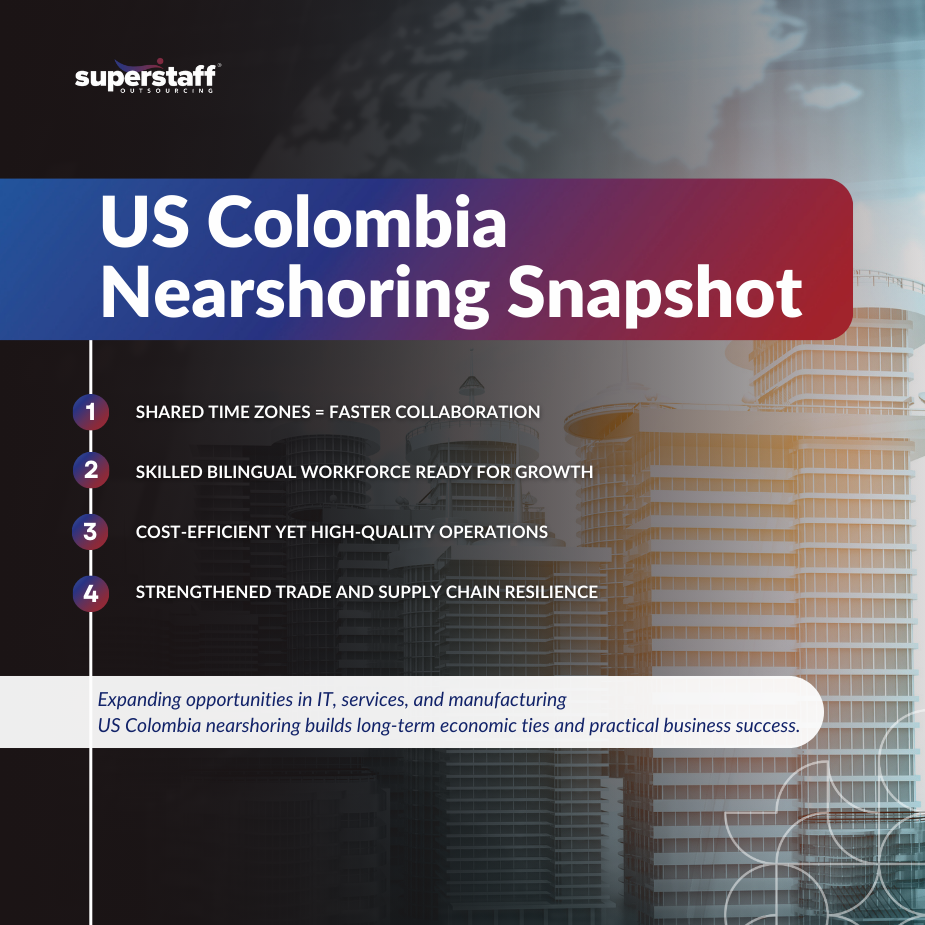
Business partnerships between the United States and Colombia are entering a new stage of growth. Many US companies are no longer looking only at distant offshore options. Instead, they are exploring opportunities closer to home through US-Colombia nearshoring. By choosing Colombia as a nearshoring hub, businesses gain access to skilled professionals, strong cultural alignment, and real-time collaboration.
This trend is not just about cutting costs. It is about building resilient supply chains, creating closer ties between the two countries, and supporting long-term growth. U.S.-Colombia nearshoring is shaping the future of outsourcing, and organizations across industries are beginning to see the benefits.

Understanding the Role of Nearshoring
Nearshoring has become a practical strategy for businesses that want efficiency, cultural compatibility, and geographic convenience. Colombia’s growing importance highlights how nearshoring can improve the US-Colombia economic relationship.
1. What Nearshoring Means
Nearshoring is when companies outsource services to nearby countries instead of faraway regions. For the US, Colombia has become one of the most attractive choices.
2. How US-Colombia Nearshoring Differs from Offshoring
Unlike offshoring to Asia or Eastern Europe, Colombia offers time zone alignment with US companies, which makes collaboration smoother.
3. Why Businesses Are Considering Colombia
US companies choose Colombia for its skilled workforce, cost savings, and growing service sectors such as IT, finance, and customer support.
4. Colombia Outsourcing Advantages
Companies benefit from affordable labor, access to bilingual professionals, and trade agreements that support business operations. These Colombia outsourcing advantages create a more reliable and efficient outsourcing relationship.
5. Common Industries Using Nearshoring
Technology development, back-office support, customer service, and financial services are among the top industries investing in US-Colombia nearshoring.
Colombia as a Nearshoring Hub for the US
Colombia has positioned itself as one of the strongest nearshoring locations for North American businesses.
1. Time Zone Alignment
Working in the same or similar time zones makes real-time communication easier. This is one of the key reasons companies adopt US-Colombia nearshoring.
2. Skilled Workforce Growth
Colombia has invested heavily in education and technical training, producing a steady pool of qualified professionals in IT, engineering, and business services.
3. Bilingual Talent and Colombia Call Center Services
The rise of the Colombia call center industry shows how bilingual professionals can provide direct support for US clients. This advantage extends beyond customer service and into technical and operational roles.
4. Competitive Costs
Colombia offers lower labor costs than US domestic hiring while maintaining high-quality standards. Businesses enjoy both savings and skilled support.
5. Trade and Political Cooperation
Trade agreements between the US and Colombia support smoother operations, compliance, and cross-border investment. This helps businesses grow with confidence.
Key Benefits of US-Colombia Nearshoring
Nearshoring is not only about proximity. It strengthens the partnership between the US and Colombia in multiple ways.
1. Faster Supply Chain Response
Shorter travel times reduce delays and allow businesses to respond more quickly to market needs.
2. Strong Cultural Compatibility
Shared cultural values and close ties between Colombia and the US make professional integration smoother.
3. Cost-Effective Operations
While not the cheapest globally, Colombia balances cost savings with high-quality output, making US Colombia nearshoring a reliable option.
4. Skilled Talent Across Industries
The country’s workforce spans technology, finance, healthcare, and logistics, ensuring a wide talent pool for US companies.
5. How Nearshoring to Colombia Enhances the US-Colombia Partnership
By choosing Colombia, US companies are strengthening trade, creating jobs, and building lasting bilateral ties that benefit both economies.
Challenges to Keep in Mind
Every business model has limitations. US-Colombia nearshoring is effective, but organizations must also weigh potential challenges.
1. Higher Costs than Offshore Markets
Some Asian countries offer lower rates than Colombia. Companies must weigh cost savings against the value of real-time collaboration.
2. Infrastructure Variability
While major cities have advanced infrastructure, rural areas may face connectivity issues.
3. Need for Strong Compliance
Companies must ensure compliance with US and Colombian labor laws, tax rules, and data protection standards.
4. Limited Scale Compared to Asia
Colombia’s talent pool, while strong, is smaller than what is available in large offshore destinations like India.
5. Dependence on Political Stability
Political and regulatory shifts can affect business operations. US companies need partners experienced in navigating these changes.
Practical Considerations for Businesses
Companies considering nearshoring to Colombia should prepare by reviewing several factors.
1. Type of Service Needed
Not all industries benefit equally. IT, customer service, and logistics are well-suited for US-Colombia nearshoring.
2. Budget Planning
Businesses should compare costs against domestic and offshore alternatives to confirm long-term savings.
3. Talent Requirements
Specific skill sets, such as bilingual capabilities or specialized technical skills, may influence the decision.
4. Long-Term Growth Potential
Nearshoring should be seen as part of a growth strategy rather than a temporary fix.
5. Partner Selection
Working with an experienced outsourcing partner in Colombia is key to successful integration.
Selecting the Right Nearshoring Partner
Strong partnerships make a difference in the success of US-Colombia nearshoring.
- Review past performance and references.
- Assess onboarding and training processes.
- Ensure clear communication and reporting protocols.
- Verify compliance with labor and data protection laws.
- Check the ability to scale resources when needed.
Building Stronger Ties Through Nearshoring
The growth of nearshoring is shaping a stronger economic partnership between the US and Colombia. Companies benefit from efficiency, collaboration, and skilled talent while Colombia strengthens its role as a trusted partner.
1. Shared Benefits for Both Economies
Nearshoring supports job creation in Colombia while improving competitiveness for US businesses.
2. Expanding Business Opportunities
More companies are investing in Colombia’s service and technology sectors, creating long-term trade stability.
3. Strengthened Trade Relationship
Nearshoring ties directly support the long-term economic partnership between the US and Colombia.
4. Opportunities in Customer Support
The success of the Colombia call center sector highlights the country’s ability to support US clients effectively.
5. Sustainable Growth Model
US-Colombia nearshoring offers stability, quality, and lasting collaboration compared to offshore models that may face greater risks.
Strengthen Your Business with Nearshore Partnerships
US-Colombia nearshoring is more than a trend. It is a reliable model that supports growth, efficiency, and stronger ties between the two countries. Companies gain skilled talent, cultural compatibility, and operational savings while contributing to a balanced trade relationship.
Working with the right partner ensures these advantages translate into long-term results. SuperStaff understands the differences between outsourcing models and has experience supporting nearshore operations in Colombia. By aligning staffing solutions with business goals, SuperStaff helps companies scale operations while maintaining quality, compliance, and efficiency.






